Myth or Fact: Clarifying the Journey

Infertility is often surrounded by myths and misunderstandings that can create unnecessary confusion. This article provides clear, evidence-based answers to common myths and facts about fertility, empowering you to make informed decisions.
We’ll discuss the prevalence of infertility, how lifestyle and age affect fertility, and whether stress plays a role—along with other common misconceptions. By the end, you’ll have a clearer understanding of the facts and feel more prepared to navigate your path to parenthood.
Myth: Infertility Is Rare
Contrary to popular belief, infertility is not rare. It affects 1 in 6 people globally, according to the World Health Organization (WHO).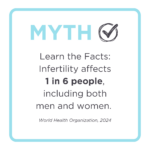
Infertility is a significant global health issue that impacts both men and women. Understanding this helps break down stigma and fosters greater support for those navigating fertility challenges. Thankfully, decades of advancements in reproductive medicine—including assisted reproductive technologies (ART), genetic screening, and improved diagnostic tools—have expanded fertility options and increased success rates. Xytex continues to play a role in this progress, providing high-quality donor options and resources to support individuals and couples.
Fact: Lifestyle Impacts Fertility
Lifestyle plays a significant role in fertility. The Centers for Disease Control and Prevention (CDC) highlights these key factors that can influence reproductive health: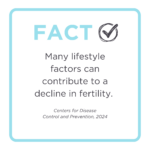
- Smoking
- Excessive alcohol use
- Poor diet or nutrition
- Obesity or low body weight
- Extreme weight fluctuations
By adopting healthier habits, you can reduce certain risks associated with infertility. Maintaining a balanced diet, avoiding harmful substances, and managing your weight are all positive steps. Speak with your healthcare provider to explore how lifestyle changes can support your fertility journey.
Myth: Infertility Only Affects Women Over 35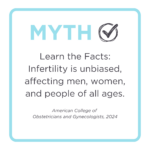
It’s a common misconception that only women over 35 struggle with infertility. In reality, it affects men and women of all ages.
According to the American College of Obstetricians and Gynecologists (ACOG), fertility naturally declines with age, especially for women over 35. However, other factors like overall health, pre-existing conditions, and lifestyle choices also play a role.
If you’re over 35 and trying to conceive, consulting a healthcare provider early can provide personalized guidance to optimize your chances of success.
Fact: Women Are Born with All Their Eggs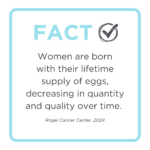
Women are born with their lifetime supply of eggs, but this number decreases over time. Here’s how it progresses:
- At birth: 1–2 million eggs
- By puberty: ~300,000 eggs remain
- By age 37: Fertility begins to decline significantly
- At menopause: Virtually no eggs remain
This process, known as ovarian aging, is natural and unavoidable. Over time, not only does the number of eggs decrease, but the quality also declines. This can make conception more challenging and increase the likelihood of chromosomal abnormalities in pregnancies. To learn more, visit the Rogel Cancer Center.
Myth: Stress Causes Infertility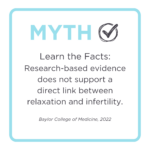
Many people believe stress can prevent conception. However, research shows no direct link between stress and infertility.
The Baylor College of Medicine explains that stress doesn’t directly impact the ability to conceive, but it can affect overall well-being. Managing stress can make the fertility journey less overwhelming. Here are some helpful strategies:
- Practice yoga or mindfulness exercises
- Keep a journal to process emotions
- Explore acupuncture
- Join support groups for connection and understanding
Focusing on mental and emotional health can make the process feel more manageable.
Fact: Xytex Offers Free 30-Day Donor Access
Did you know Xytex provides free, 30-day full access to donor profiles? This offering makes it easier to find the right donor for your journey.
What does this include?
- Physical attributes
- Educational background
- Personality traits (Keirsey Personality Assessment and personal essays)
- Medical and family history
- Genetic testing information
- Childhood and adult photos
Xytex is the only bank offering this level of access at no cost. This resource empowers you to make confident, informed decisions about your fertility journey. Learn more at xytex.com/register.
Your Journey, Our Commitment
Clarifying myths and understanding facts about infertility is the first step to making empowered decisions. Whether you’re exploring lifestyle changes, seeking medical guidance, or using Xytex’s free donor access, every step brings you closer to your dream of parenthood.
If you have questions or need guidance, contact us at 706.733.0130 or info@xytex.com. We’re here to support you on this incredible journey and help you deliver joy.
Watch more of our videos on our YouTube channel.



